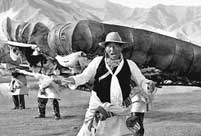 Chinese Air Force's combat group organizes actual-combat training
Chinese Air Force's combat group organizes actual-combat training Owner ordered to demolish building
Owner ordered to demolish building
 'Zombies' haunt Kaohsiung MRT
'Zombies' haunt Kaohsiung MRT
 26 Palestinian prisoners arrive in West Bank, Gaza
26 Palestinian prisoners arrive in West Bank, Gaza
 Collective wedding ceremony for 'Beijing drifters’ held in Happy Valley
Collective wedding ceremony for 'Beijing drifters’ held in Happy Valley
 Chinese characters tattoos: be careful to choose the right characters!
Chinese characters tattoos: be careful to choose the right characters!
 Zimbabwe celebrates Defence Forces Day in Harare
Zimbabwe celebrates Defence Forces Day in Harare
 Questioning China's real achievements
Questioning China's real achievements
 Xinhua sports photo of week (Aug. 5- Aug. 11)
Xinhua sports photo of week (Aug. 5- Aug. 11)Economists on Tuesday welcomed the slight fall in British consumer price inflation (CPI) and said it could herald a period of sustained downward movement in inflation figures.
British CPI edged down to 2.8 percent in July after rising to a 14-month high of 2.9 percent in June, according to figures released Tuesday. This marked a steady upward curve from 2.7 percent in May and a seven-month low of 2.4 percent in April.
Downward influences on CPI in July came from summer sales discounting of clothes and shoes, with clothes down 3.2 percent month on month.
There was also downward pressure from air fares and from the recreation and culture sector.
Martin Beck, British economist with Capital Economics in London, told Xinhua, "Our expectation is that this is the start of a sustained drop in inflation we will see over the next few months. It looks like producer price pressures are quite weak that will seep through into lower CPI over time."
Wage growth was muted, said Beck, and as the economy recovers and activity picks up, unit labor costs will fall and that will also help lower inflation.
"We expect inflation to drift down over the next few months, and potentially get close to the 2 percent Bank of England (BOE) target by the end of the year," he said.
James Knightley, senior UK economist with ING, said the small fall in CPI inflation was in line with market expectations. He added that new guidelines from the BOE focused on 7 percent unemployment as a marker for raising interest rates.
However, Knightley warned that any future upward pressures on inflation could see the BOE use its opt outs from the pledge on tracking unemployment to raise interest rates.
David Kern, chief economist with the industry body British Chambers of Commerce, said, "At a time when earnings growth is weak and the government is pressing ahead with its austerity measures, any fall in inflation eases the pressure on businesses and consumers."
He said there was greater hope that increases in inflation above 3 percent could be avoided, but the situation remained uncertain and renewed surges in energy prices could push inflation up again.
"The British economy is now recovering at a moderate pace, and we would urge the government do everything possible to sustain recent positive trends," he added.
Howard Archer, chief UK and Europe economist with IHS Global Insight, said there could be inflation rises in the short term, "CPI may yet touch 3 percent in the near term, but it should start heading gradually down towards the end of the year".
Archer said base effects would be particularly challenging in the near term, as CPI fell from 2.6 percent in July 2012 to 2.2 percent in September.
"Underlying price pressures should be held down through the rest of this year and beyond by significant excess capacity, ongoing muted wage growth amid appreciable labour market slack, and limited scope for retailers to raise prices given still significant pressures on consumers' purchasing power," he added.
Archer said that although the economy had strengthened recently, it seemed unlikely to generate significant underlying inflationary pressures as there was slack in the economy after extended very weak economic activity.
Archer forecast CPI as 2.7 percent at the end of 2013, trending down through 2014.
 Helicopters, tanks seen during China-Russia joint drill
Helicopters, tanks seen during China-Russia joint drill Conjoined twins separated in groundbreaking surgery
Conjoined twins separated in groundbreaking surgery Junpa village: The only fishing village in Tibet
Junpa village: The only fishing village in Tibet Unmanned Systems 2013 Exhibition kicks off in Washington
Unmanned Systems 2013 Exhibition kicks off in Washington 3D painting, new way to promote apartment sale
3D painting, new way to promote apartment sale Review: Asian Men's Basketball Championship
Review: Asian Men's Basketball Championship Air Force's combat group conducts flight training in joint drills
Air Force's combat group conducts flight training in joint drills Unmanned Systems 2013 Exhibition kicks off in Washington
Unmanned Systems 2013 Exhibition kicks off in Washington Various sun protective outfits
Various sun protective outfits Top 10 most dangerous jobs in the world
Top 10 most dangerous jobs in the world Snapshots of 14th IAAF Athletics Championships Moscow 2013
Snapshots of 14th IAAF Athletics Championships Moscow 2013 Geomancy city Ganzhou
Geomancy city GanzhouDay|Week|Month